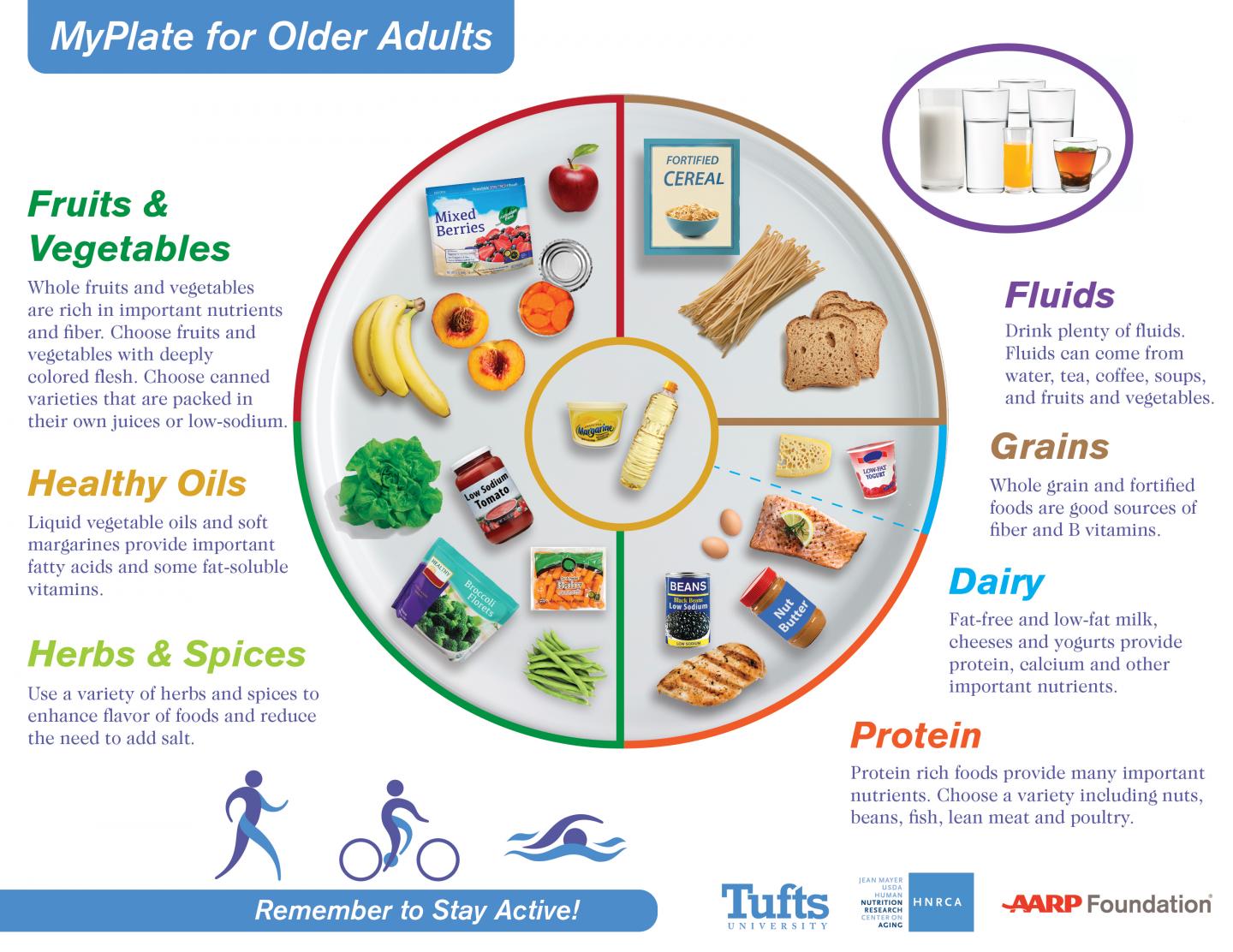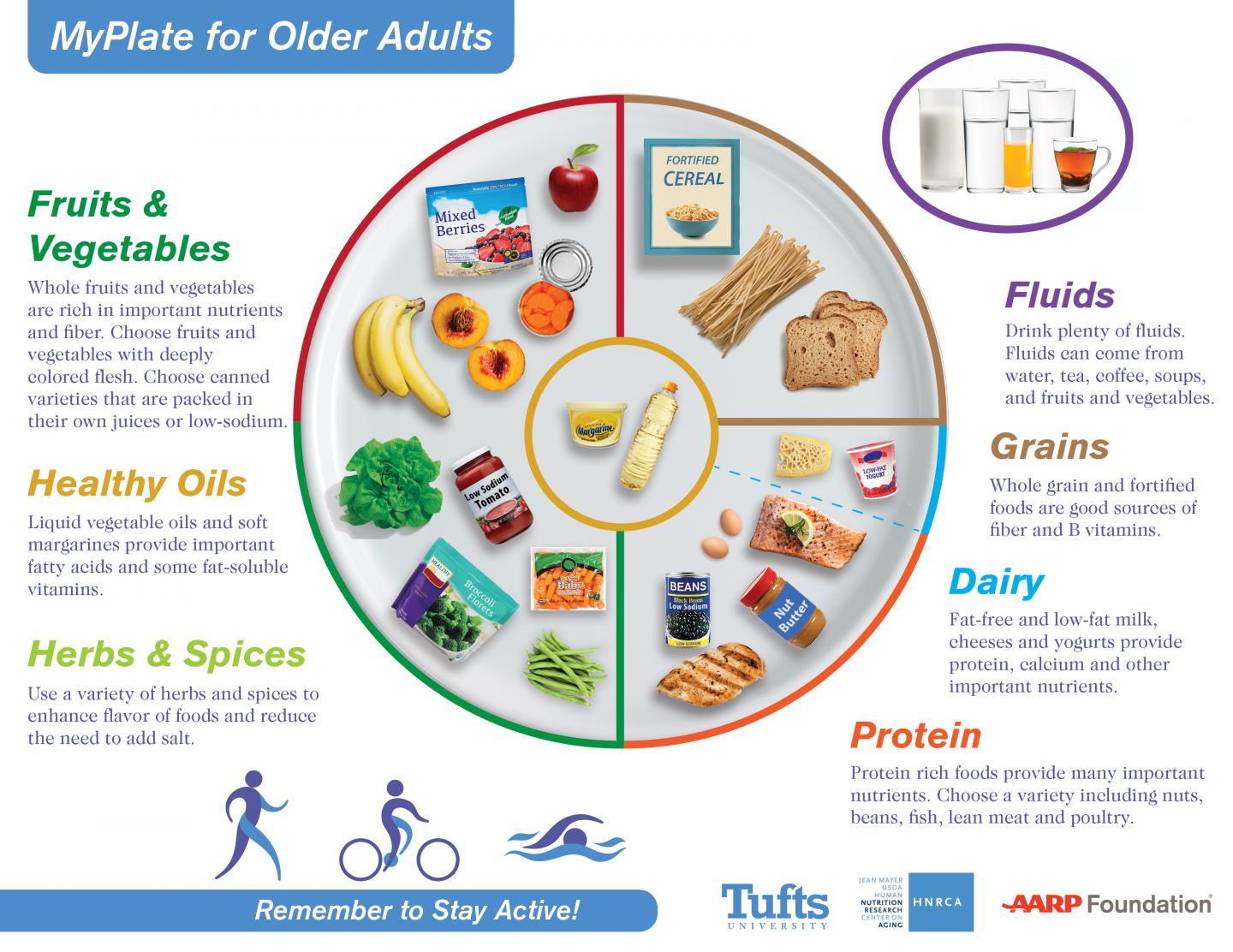
BOSTON (March 7, 2016)–Nutrition scientists at the Jean Mayer U. S. Department of Agriculture Human Nutrition Research Center on Aging (USDA HNRCA) at Tufts University with support from AARP Foundation are introducing an updated MyPlate for Older Adults icon today. The updated icon emphasizes the nutritional needs of older adults in a framework of the 2015-2020 Dietary Guidelines for Americans from the U.S. Department of Health and Human Services and the U.S. Department of Agriculture. The icon and an accompanying website can be viewed at hnrca.tufts.edu/myplate.
"It is never too late to make smart changes in your diet. Shifting towards healthier food choices can improve symptoms or decrease risk for developing chronic diseases such as type 2 diabetes, hypertension and heart disease – all of which are more common in older than younger adults," said Alice H. Lichtenstein, D.Sc., senior scientist and director of the Cardiovascular Nutrition Laboratory at the USDA HNRCA. Lichtenstein served as vice chair on the 2015 Dietary Guidelines Advisory Committee.
The new MyPlate for Older Adults icon depicts a colorful plate with images to encourage older Americans to follow a healthy eating pattern bolstered by physical activity. The plate is composed of approximately:
- 50 percent fruits and vegetables;
- 25 percent grains, many of which are whole grains; and
- 25 percent protein-rich foods such as nuts, beans, fish, lean meat, poultry, and fat-free and low-fat dairy products such as milk, cheeses, and yogurts.
The new MyPlate for Older Adults icon also includes images of good sources of fluid, such as water, milk, tea, soup, and coffee; heart-healthy fats such as vegetable oils and soft margarines; and herbs and spices to be used in place of salt to lower sodium intake.
"We are so proud to collaborate with the USDA HNRCA at Tufts on the MyPlate for Older Adults icon to create practical nutritional guidance and awareness of the need for accessible meals," said Jim Lutzweiler, vice president, hunger impact area, AARP Foundation. "We believe at AARP Foundation in the importance of encouraging vulnerable and low-income older adults to develop healthy eating and physical activity patterns to maintain quality of life as they age."
The MyPlate for Older Adults icon also reminds older Americans to stay active by walking, riding a bicycle, swimming, or engaging in another activity. The Dietary Guidelines offers suggestions for older adults who are interested in improving their lifestyle and reducing their risk of disease and disability with regular exercise.
"Older adults who want to improve their overall health will benefit from using MyPlate for Older Adults. Many people are not aware of the key role that healthy eating patterns play in improving their bodily function such as that of brain, eye and the immune system," said Simin Nikbin Meydani, D.V.M., Ph.D., director of the Jean Mayer USDA HNRCA at Tufts University in Boston, and senior scientist and director of its Nutritional Immunology Laboratory. "Our collaboration with AARP Foundation will help us empower a larger group of older Americans to act on the Dietary Guidelines by making our new MyPlate for Older Adults icon more widely available."
The 2015 Dietary Guidelines recommend that Americans:
- Follow a healthy eating pattern across their lifespan;
- Focus on the variety and amount of nutrient-dense food they consume;
- Reduce their intake of added sugars, saturated fats and sodium to allowed limits;
- Shift toward healthier food and beverage choices; and,
- Support healthy eating patterns for all.
Lichtenstein advises older adults to begin by making small shifts in food and beverage choices to improve their overall eating pattern, and then continue to build on them. Making small changes, she says, and sticking with them is the best approach to long term improvements in eating habits. If someone plans on making major changes in their diet they are advised to talk with their primary healthcare provider.
The website that accompanies the updated MyPlate for Older Americans icon offers information about physical activity, using spices to reduce sodium, shopping tips, and recipes. Additionally, the MyPlate for Older Adults emphasizes all forms of food – fresh, frozen, dried and canned – to ensure the icon is relevant across personal preferences, availability, and cultural backgrounds. The website also offers helpful links to studies from researchers at the USDA HNRCA that are especially relevant for older adults. Both can be found online at hnrca.tufts.edu/myplate.
The updated MyPlate for Older Adults is the fourth such icon created by Lichtenstein and USDA HNRCA researchers specifically for older adults. AARP Foundation provided funding and creative input for the newest icon of MyPlate for Older Adults and the related website.
###
About the Jean Mayer USDA Human Nutrition Research Center on Aging and the Friedman School of Nutrition Science and Policy
For three decades, the Jean Mayer USDA Human Nutrition Research Center on Aging at Tufts University has studied the relationship between good nutrition and good health in aging populations. Tufts research scientists work with federal agencies to establish the USDA Dietary Guidelines for Americans, the Dietary Reference Intakes, and other significant public policies. The Gerald J. and Dorothy R. Friedman School of Nutrition Science and Policy at Tufts University is the only independent school of nutrition in the United States. The school's eight degree programs – which focus on questions relating to nutrition and chronic diseases, molecular nutrition, agriculture and sustainability, food security, humanitarian assistance, public health nutrition, and food policy and economics – are renowned for the application of scientific research to national and international policy.
Media Contact
Siobhan Gallagher
[email protected]
617-636-6586
@tuftspr
http://www.tufts.edu





